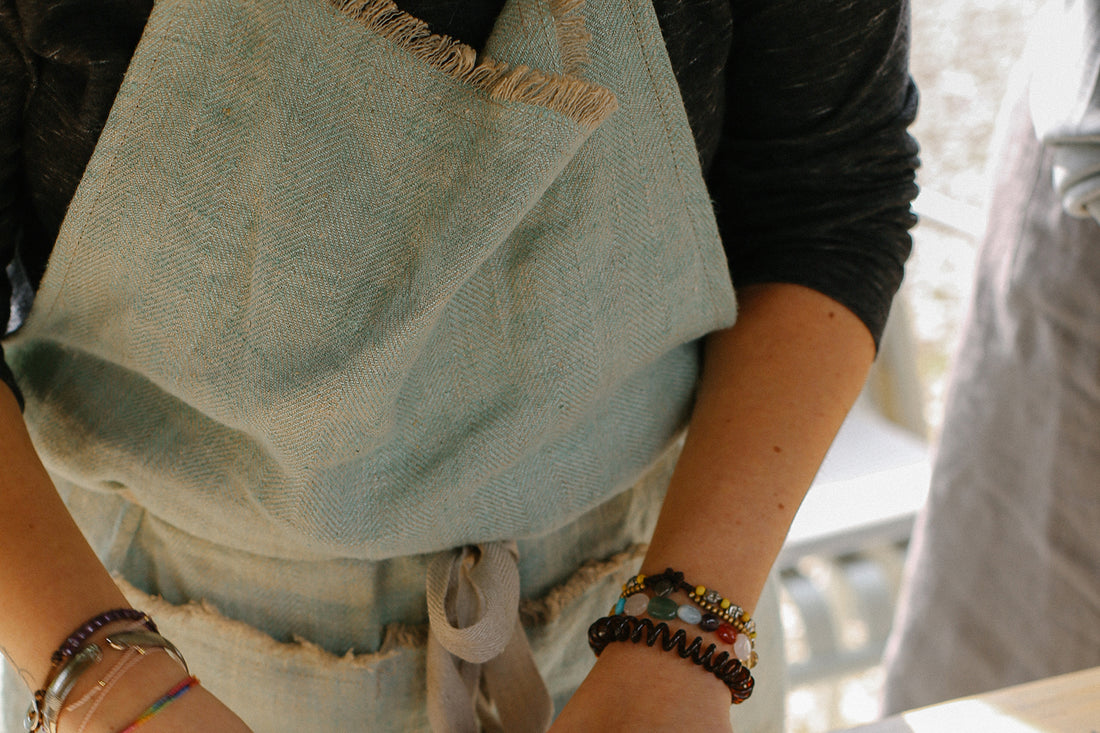-We ask, they answer-

We inaugurate a new section of our home blog called "We ask, they answer" where each month interior designers, decorators and people who inspire us in the use of natural textiles and sustainability will answer questions about lifestyle, give advice on decoration and useful tips to have a much more sustainable home.
In our second interview, the questions are addressed to Mónica Rosquillas, a woman who carries "zero waste" as a flag, a woman who lives sustainably and with the lifestyle that she shows on social networks , inspires many people with the aim of being more respectful of our environment.

You have captivated us with your sustainable lifestyle. What was your turning point?
Since I was little I felt a connection with nature and the desire to want to protect it. However, it was not until about 8 years ago, when I was working as an environmental educator, that my lifestyle took a big change. As part of my job, I went to schools every week to talk to students about the tremendous amount of garbage we generate, the negative impacts it has on the environment, and the actions they themselves could take to be part of the solution. Soon I realized that I, and my lifestyle, are also contributing to this contamination and I began to change some things. Before, I did use my cloth bag to go shopping at the supermarket, the reusable water bottle, and I recycled, but that was it. Maybe a year later I started an account on instagram, then called Girlforacleanworld, because I wanted to share this environmental education, which I believed and still believe is essential, with a larger audience. Being on instagram I discovered that there were people who lived a zero waste lifestyle and I immediately felt that it was my thing. I got hooked on the subject and drastically changed my consumption habits. Almost 7 years have passed and it has been one of the best decisions I have made.
What do you advise someone who wants to change their habits for more sustainable ones with the environment?
First of all, I think it's great! The planet needs everyone. I advise starting small. Changing our habits is a challenge, and we must think that we are making a change for life, and of course, this must be sustainable for us. So start small and make more changes as you learn and adapt. If you want to reduce the amount of garbage you generate, I recommend you first analyze what type of products you consume and what type of garbage you generate and look for alternatives with less waste. It is important to give preference to reducing and reusing rather than recycling. It is also important to remember that zero waste is not the end, it is a means that allows us to reduce our footprint and benefits the planet. Actually there are many things that we can do, the good thing is that there is a lot of information online and many books that can help us.
In your profile, which we have been following for a long time, you share your lifestyle, but what has been the most difficult for you to change?
This question is a bit difficult for me since I don't think there is something specific that has cost me the most to change In general, what has cost me the most in this lifestyle is finding balance. I've been through stages when I've wanted to make it perfect, meaning no garbage at all, eating everything plant-based and organic, and consuming as little as possible, and that wasn't sustainable! Not only was it not sustainable for me, but I was focusing my energy on small details with little importance, when I could have been focusing that energy on actions with a larger impact such as activism or educating other people. Today I consider myself an imperfect environmentalist.
At dE.LENZO we highlight the importance of using natural fabrics and fibers to achieve a healthier home. What do you think are the advantages of using products made from these fibers? One advantage is that natural fibers are not made from fossil fuels like oil. Nowadays, a lot of clothes are made of materials like polyester, which is not compostable, releases plastic microfibers every time it is washed, and contributes to climate change. If you had to add only one piece of linen in your space, what would it be? Without a doubt, a duvet cover. THANK YOU MONICA!




